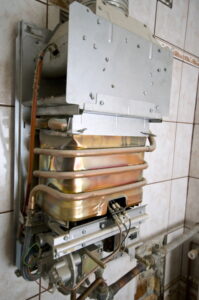Furnaces can run from a wide range of fuel types. There are even wood-burning furnaces in use today, although they burn a type of compressed wood pellet that makes them more energy-efficient than old-fashioned furnaces. Other fuel types include oil and liquid propane. However, for most homes, it comes down to two energy choices: a gas-burning furnace or an electric furnace.
The “gas vs. electric” choice often isn’t difficult. If you live in an all-electric home that doesn’t have access to a natural gas line, a gas furnace is not an option. (On the other hand, an electric furnace isn’t your only option for winter warmth; you can also consider a heat pump, which is a whole other topic.) But there are situations where you may find yourself balanced between gas and electric. Is there a better choice between the two? It depends. We recommend you schedule professional furnace service in Mansfield, LA with our team to help you determine your best heating installation.
We’ll give you a head start thinking about furnace type below as we list the pros and cons of these two popular furnaces.
Gas Furnaces
Pros: Gas furnaces are found in more homes in the country than any other type of central heating system, and for some good reasons. Gas furnaces are powerful and can provide enough heat to overcome the coldest day, as well as help drafty older homes stay warm. They work fast at providing heat. Because natural gas is less costly in most areas than electricity, natural gas furnaces can help save money each winter. Natural gas is the most convenient of the various heating oils used for furnaces because it’s piped directly to a home—it doesn’t need to be ordered and stored.
Cons: It is more expensive to install a gas furnace compared to an electric one. Gas furnaces also wear down faster than electric ones because of the slow corrosive effect of combustion vapor, so they don’t last as long. Gas furnaces can also create safety hazards from leaks and combustion, although regular maintenance can keep the danger to a minimum.
Electric Furnaces
Pros: Electric furnaces are flexible—as long as a house has electricity, it can use an electric furnace. Electric furnaces cost less to install upfront than gas furnaces and can last five years longer on average. There are few safety concerns with electric furnaces, so homeowners who are worried about using natural gas for heating might find going electric will put their minds at ease.
Cons: In most areas, electricity costs more to use than natural gas, and electric furnaces can run up much higher bills over the winter. They also work slower at delivering heat and don’t have the same capacity as gas furnaces. Some homeowners find heat pumps a more cost-effective way to get heat through electricity.
Making the Choice
If you still aren’t sure about the best heating option for your home, you’ve found the right people to assist you. We’ll go over your options and help you choose the heating system that will meet your different needs. We have more than 50 years of history helping local homes get the best comfort.
Moon’s Air has provided whole-home comfort since 1971. Call us for service today—it’s good to be Mooned!










